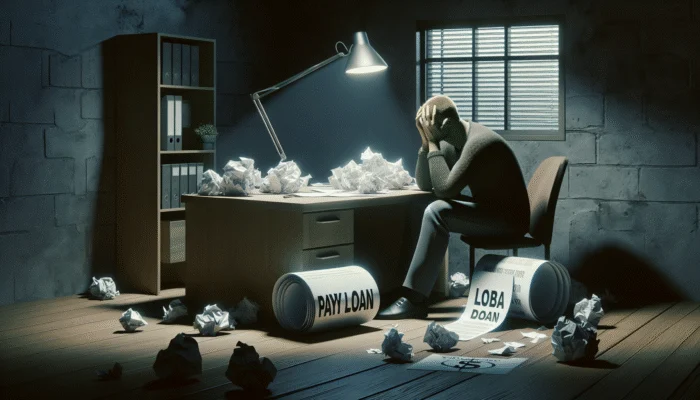Key Insights on Payday Loan Shame
- Causes: Payday loan shame stems from societal stigma and personal guilt related to financial difficulties.
- Emotional Impact: The shame linked to payday loans can lead to increased stress, anxiety, and depression.
- Coping Strategies: Healthy coping mechanisms, such as mindfulness and support networks, are vital for overcoming shame.
- Financial Education: Understanding personal finance is crucial in reducing reliance on payday loans and associated shame.
Understanding Payday Loan Shame

What Causes Payday Loan Shame?
Payday loan shame often arises from a combination of societal stigma and personal guilt associated with financial struggles. In the United States, many individuals feel pressured to maintain a certain image of financial success, which can lead to feelings of inadequacy when faced with the need for high-interest loans. The perception that payday loans are a desperate measure creates a narrative that shame is attached to seeking financial assistance. This stigma is compounded by the media portrayal of financial irresponsibility, making those who utilize payday loans feel judged and isolated. Understanding these underlying causes is essential, as it allows individuals to reframe their experiences and recognize that financial challenges are common and can happen to anyone. By acknowledging that such situations do not define their worth, individuals can begin to dismantle the feelings of shame associated with payday loans.
The Psychological Impact of Payday Loan Shame
The emotional toll of payday loan shame is significant, often leading to increased stress, anxiety, and even depression. When individuals feel shame about their financial situation, it can interfere with their daily lives, affecting relationships, work performance, and overall mental health. The fear of being judged by peers or loved ones can further isolate them, creating a vicious cycle of shame and financial distress. Research has shown that financial stress is closely linked to mental health issues. For those dealing with payday loans, the constant worry about repayment, high-interest rates, and the risk of falling deeper into debt can create a sense of helplessness. Understanding this psychological impact is crucial in developing effective coping mechanisms.
Coping Mechanisms for Payday Loan Shame

Developing healthy coping strategies is vital for mitigating the effects of payday loan shame. Individuals can benefit from practices such as mindfulness, which encourages self-awareness and acceptance of one’s situation without judgment. Mindfulness techniques, such as meditation and deep breathing exercises, can help reduce anxiety and foster a more positive mindset. Additionally, building a support network is crucial. Surrounding oneself with understanding friends and family can provide emotional relief and practical advice. Many individuals find solace in sharing their experiences with others who have faced similar challenges. Lastly, seeking professional help is a proactive step. Financial counselors can provide valuable insights into managing debt, while therapists can help address the emotional burden associated with financial shame.
Overcoming Payday Loan Shame
To effectively overcome payday loan shame, individuals should take structured steps that focus on financial education, self-acceptance, and seeking assistance. Education is crucial; individuals should seek resources that enhance their understanding of personal finance, including budgeting, saving, and debt management. This knowledge empowers them to make informed decisions moving forward. Seeking debt relief options is another essential step. Individuals should explore local programs that offer assistance to those struggling with payday loans, which can include negotiation with lenders or enrolling in debt management plans. Additionally, fostering a positive self-image is vital. Engaging in self-reflection and acknowledging one’s strengths can help rebuild confidence.
- Educate yourself about personal finance.
- Seek professional financial advice.
- Engage in open discussions about finances.
- Join support groups for emotional support.
- Practice self-acceptance to build confidence.
- Explore debt relief options available in your community.
- Utilize financial management tools to track your progress.
- Commit to ongoing financial education and self-improvement.
Expert Insights on How to Deal with Payday Loan Shame
What Are the Best Practices for Managing Shame?

Best practices for managing payday loan shame involve a combination of transparency, education, and professional guidance. Individuals who successfully navigate their financial challenges often share their stories openly, which helps demystify the stigma surrounding payday loans. Financial education is also a cornerstone of effective shame management. Individuals who equip themselves with knowledge about budgeting, saving, and debt management are better positioned to make informed financial decisions. Moreover, establishing a budget and sticking to it can significantly alleviate feelings of shame.
How Can Experts Help with Payday Loan Shame?
Experts play a crucial role in helping individuals navigate the complexities of payday loan shame. Financial counselors can provide actionable strategies tailored to an individual’s circumstances, helping them understand the implications of payday loans and the best steps to take moving forward. Therapists trained in financial therapy can address the emotional aspects of financial struggles. Additionally, experts can connect individuals with resources such as debt relief programs, which may include negotiation services with lenders or financial assistance programs.
What Role Does Financial Education Play?
Financial education is pivotal in overcoming payday loan shame, as it equips individuals with the knowledge necessary to make informed decisions about their finances. Understanding the mechanics of personal finance, including how interest rates work and the ramifications of taking loans, can help individuals avoid the pitfalls that lead to payday loans in the first place. Furthermore, financial education promotes responsible spending habits and effective money management.
How Can You Overcome Payday Loan Shame?
What Steps Should You Take to Overcome Shame?
Overcoming payday loan shame requires a proactive approach that includes actionable steps to regain control of one’s financial situation. Creating a realistic budget is essential, allowing individuals to prioritize essential costs while reducing discretionary spending. Another critical step involves consolidating debt where possible. Engaging with community resources, such as financial counseling services, can provide additional support. Finally, openly discussing financial issues with trusted family members or friends can foster a supportive environment, reducing feelings of shame and isolation.
- Create a detailed budget to track income and expenses.
- Explore debt consolidation options to simplify repayments.
- Seek professional financial counseling for personalized advice.
- Engage in open conversations about financial challenges.
- Utilize community resources for financial education.
- Develop a plan to gradually pay down debts.
- Join financial recovery workshops for additional support.
- Set realistic financial goals to work towards recovery.
Building a Support Network for Financial Recovery
Establishing a support network is crucial for overcoming payday loan shame and fostering financial recovery. Surrounding oneself with understanding individuals creates a safe space to share experiences, seek advice, and gain encouragement. Support groups, often facilitated by financial educators or therapists, can offer a sense of community for those facing similar challenges. Additionally, online communities and forums can also serve as valuable resources, allowing individuals to connect with others facing similar financial issues.
The Importance of Self-Compassion in Recovery
Practicing self-compassion is a vital aspect of recovering from payday loan shame. This involves treating oneself with kindness and understanding rather than judgment. Incorporating self-compassion into recovery allows individuals to acknowledge their mistakes without losing sight of their worth. Engaging in positive affirmations can also shift the focus from shame to resilience, encouraging individuals to view their financial journey as an opportunity for growth.
Strategies for Rebuilding Financial Health
How Can You Rebuild Your Credit After Payday Loans?
Rebuilding credit after the use of payday loans is a critical step in regaining financial health. Responsible borrowing practices are essential; individuals should focus on timely payments on any outstanding debts, as this demonstrates financial responsibility to credit bureaus. Additionally, utilizing credit-building tools can be beneficial. Monitoring one’s credit report regularly can also prove invaluable.
- Make timely payments on all existing debts.
- Utilize secured credit cards to build credit history.
- Monitor your credit report for inaccuracies.
- Keep credit utilization low (ideally under 30%).
- Consider a credit-builder loan for positive reporting.
- Engage in responsible credit usage to improve scores.
- Seek professional advice if credit issues persist.
- Set specific goals for credit improvement over time.
Developing a Sustainable Budget Plan
A sustainable budget plan is paramount for long-term financial health and avoiding reliance on payday loans. The first step in creating a budget is assessing current income and expenses. Setting realistic spending limits for each category is essential. Additionally, it is crucial to regularly review and adjust the budget as necessary. Utilizing budgeting apps or tools can simplify this process.
- Assess income and categorize expenses accurately.
- Set realistic spending limits in each category.
- Identify areas to reduce discretionary spending.
- Regularly review and adjust the budget as necessary.
- Utilize budgeting apps for tracking and insights.
- Prioritize saving for emergencies and debt repayments.
- Engage in monthly budget discussions with family members.
- Stay flexible to adapt to changing financial circumstances.
Exploring Alternative Financial Resources
Seeking out alternative financial resources is crucial for individuals looking to avoid the pitfalls of payday loans. Credit unions often offer lower-interest personal loans as an alternative to payday lending. Additionally, individuals can explore local nonprofit organizations that offer financial assistance programs. Furthermore, peer-to-peer lending platforms have emerged as viable alternatives.
- Consider credit union loans for lower-interest options.
- Research local nonprofit organizations for assistance.
- Explore peer-to-peer lending platforms as alternatives.
- Engage with community resources for financial education.
- Seek personal loans with favorable terms.
- Participate in workshops on alternative financing options.
- Stay informed about government assistance programs.
- Connect with financial advisors for tailored advice.
Trusted Strategies for How to Deal with Payday Loan Shame
What Are Effective Communication Strategies?
Effective communication about financial struggles is essential for reducing payday loan shame. Individuals should consider being open and honest with trusted family members and friends about their financial situations. Additionally, utilizing community resources, such as financial counseling services, can provide individuals with strategies for effective communication.
- Be open and honest with trusted individuals about finances.
- Communicate clearly with creditors about financial challenges.
- Utilize community resources for communication strategies.
- Practice active listening in financial discussions.
- Seek feedback from supportive friends or advisors.
- Prepare key points before important conversations.
- Establish a plan for ongoing financial discussions.
- Encourage open dialogue about financial education.
How Can Legal Assistance Help with Payday Loans?
Understanding legal assistance options is vital for managing payday loan shame effectively. Legal professionals can help individuals understand their rights regarding payday lending practices. Additionally, legal assistance can help individuals navigate the complexities of bankruptcy as a last resort. Furthermore, legal advocates can assist in negotiating with lenders.
- Consult with legal professionals about payday lending rights.
- Understand state laws regarding payday loans and interest rates.
- Explore bankruptcy options with specialized attorneys.
- Seek assistance in negotiating repayment terms with lenders.
- Educate yourself about consumer protection laws.
- Consider legal aid organizations for affordable assistance.
- Prepare documentation for any legal consultations.
- Stay informed about your rights as a borrower.
The Role of Financial Therapy in Recovery
Financial therapy plays a transformative role in addressing both the emotional and practical aspects of payday loan shame. Through financial therapy, individuals can confront the feelings of shame and guilt associated with their financial struggles. This therapeutic approach encourages self-reflection and promotes healthier attitudes toward money.
- Engage with professionals trained in financial therapy.
- Explore personal beliefs about money and spending.
- Address emotional triggers related to financial decisions.
- Incorporate practical financial strategies into therapy sessions.
- Foster a positive relationship with money through self-reflection.
- Set realistic goals for financial recovery.
- Utilize therapy as a tool for both emotional and practical growth.
- Commit to ongoing self-improvement in financial habits.
How Can Support Groups Aid in Overcoming Shame?
Joining support groups can provide a powerful avenue for individuals seeking to overcome payday loan shame. These groups often consist of individuals facing similar financial challenges, creating a community of understanding and empathy. Support groups often offer practical resources and strategies for managing finances and overcoming debt.
- Participate in groups with shared financial challenges.
- Share experiences to reduce feelings of isolation.
- Access practical resources for managing finances.
- Engage in structured discussions led by trained facilitators.
- Foster a sense of community and understanding.
- Explore diverse perspectives on financial recovery.
- Encourage accountability among group members.
- Commit to regular attendance for ongoing support.
Preventing Future Payday Loan Shame
How Can You Avoid Falling into Payday Loan Traps?
Learning to recognize the signs of predatory lending is essential for preventing future payday loan shame. Individuals should familiarize themselves with the terms and conditions that often accompany payday loans. Additionally, it is important to consider alternative financial resources before resorting to payday loans. Developing a habit of budgeting and financial planning can help individuals prepare for unexpected expenses.
- Familiarize yourself with payday loan terms and predatory practices.
- Research alternative financial resources before borrowing.
- Engage in financial planning to prepare for emergencies.
- Create an emergency fund to avoid high-interest loans.
- Educate yourself on financial literacy and budgeting.
- Stay informed about community programs for financial assistance.
- Discuss financial options with trusted advisors.
- Commit to ongoing financial education and awareness.
Building an Emergency Fund for Financial Security
Establishing an emergency fund is a vital strategy for enhancing financial security and reducing reliance on payday loans. An emergency fund acts as a financial buffer, providing individuals with the resources needed to cover unexpected expenses. Building an emergency fund requires a disciplined approach to saving.
- Determine a realistic savings goal based on monthly expenses.
- Set aside a small amount from each paycheck for savings.
- Automate savings to simplify the process.
- View the emergency fund as a financial priority.
- Gradually build the fund over time to reach your goal.
- Utilize the fund only for true emergencies.
- Regularly review and adjust your savings strategy.
- Encourage family members to contribute to the fund as well.
The Importance of Financial Literacy Education
Ongoing financial literacy education is essential for empowering individuals to make informed financial decisions and reducing the likelihood of experiencing payday loan shame in the future. Financial literacy programs are widely available, covering various topics, including budgeting, saving, and understanding credit. Engaging in these educational opportunities allows individuals to build a solid foundation of financial knowledge.
- Engage in community financial literacy programs.
- Enroll in online courses focused on personal finance.
- Attend workshops that cover budgeting and saving strategies.
- Stay informed about changes in financial products and laws.
- Promote financial literacy discussions within families.
- Utilize library resources for self-education on finance.
- Encourage friends to participate in financial education together.
- Commit to lifelong learning in personal finance.
FAQs
What is payday loan shame?
Payday loan shame refers to the feelings of guilt and stigma associated with needing to rely on payday loans due to financial struggles. It’s a common issue that can have significant emotional and psychological impacts.
How can I overcome payday loan shame?
To overcome payday loan shame, individuals should focus on financial education, develop a positive self-image, seek support from loved ones, and engage in open conversations about their financial circumstances.
What are some coping strategies for payday loan shame?
Coping strategies include mindfulness practices, building a support network, seeking professional help, and openly discussing financial challenges with trusted friends or family members.
How can financial education help with payday loan shame?
Financial education empowers individuals with the knowledge and skills necessary to manage their finances effectively, helping them avoid reliance on payday loans and reducing feelings of shame.
What role do support groups play in overcoming shame?
Support groups provide a community of understanding individuals who share similar financial challenges, helping to reduce isolation and promote healing through shared experiences and resources.
What steps can I take to rebuild my credit after payday loans?
Rebuilding credit involves making timely payments on existing debts, using credit-building tools like secured cards, and monitoring your credit report for inaccuracies.
How can I communicate about my financial struggles effectively?
Effective communication involves being open and honest with trusted friends and family, clearly articulating challenges to creditors, and seeking feedback from supportive individuals.
What are alternative financial resources to payday loans?
Alternative resources include credit union loans, personal loans from reputable lenders, community assistance programs, and peer-to-peer lending platforms, which often offer more favorable terms than payday loans.
How important is self-compassion in financial recovery?
Self-compassion is crucial as it allows individuals to treat themselves kindly, reducing feelings of shame and guilt while encouraging proactive steps toward financial recovery and growth.
What can I do to prevent future payday loan shame?
To prevent future shame, individuals should focus on building an emergency fund, enhancing financial literacy, and recognizing the signs of predatory lending to avoid falling into similar traps again.
Disclaimer: This blog does not offer tax, legal, financial planning, insurance, accounting, investment, or any other type of professional advice or services. Before acting on any information or recommendations provided here, you should consult a qualified tax or legal professional to ensure they are appropriate for your specific situation.
Daniel R. Whitman is a licensed financial consultant and content writer based in Southlake, Texas. With over 9 years of experience in payday lending, personal credit, and emergency cash solutions, he is passionate about providing honest, accessible advice to help Texans make better financial decisions. Daniel specializes in demystifying short-term loans and empowering readers with tools to manage debt responsibly. Outside of work, he enjoys mentoring young professionals and staying active in his local community.


You’ve highlighted such an important issue that often goes unnoticed. The shame surrounding payday loans can indeed create a cycle of stress that exacerbates financial difficulties. I remember a time when I felt trapped in a similar situation, burdened by both the financial strain and the stigma surrounding it.
It’s refreshing to hear your perspective on this issue, as it’s often shrouded in silence and misunderstanding. The feeling of being trapped, not just by financial obligations but by the accompanying stigma, can be incredibly isolating. When you’re navigating that kind of pressure, it’s easy to feel like you’re the only one facing such a struggle, even though payday loans are an issue that affects many people.
You’ve touched on such an important and often overlooked issue with payday loan shame. I can relate to the feelings of inadequacy that come from the looming societal expectations of financial stability. It’s fascinating to think about how deeply ingrained these perceptions are in our culture, often leaving people feeling isolated and ashamed.
This is such an important topic that often gets overlooked. I remember when I was in a tough financial spot and had to consider payday loans. The shame I felt was overwhelming, not just from the loans themselves but from feeling like I was failing to manage my finances. It’s interesting how society equates financial struggle with personal failure, creating this cycle of shame that just adds to the stress.
It’s interesting to reflect on how payday loan shame not only impacts individuals but also perpetuates a wider cycle of financial miseducation. Many people may not realize that financial struggles are more common than they think, and they might be surprised to learn that seeking help is a sign of strength, not weakness. It reminds me of how important community support can be; having open conversations about money can help destigmatize these challenges.
You’ve highlighted a crucial aspect of payday loan shame that many overlook—the social narrative surrounding financial hardship. It’s interesting how societal pressure about financial success can hinder honest conversations about money, leading individuals to feel isolated in their struggles. I’ve noticed that this stigma can create a vicious cycle: the more shame people feel, the less likely they are to seek help or share their experiences.